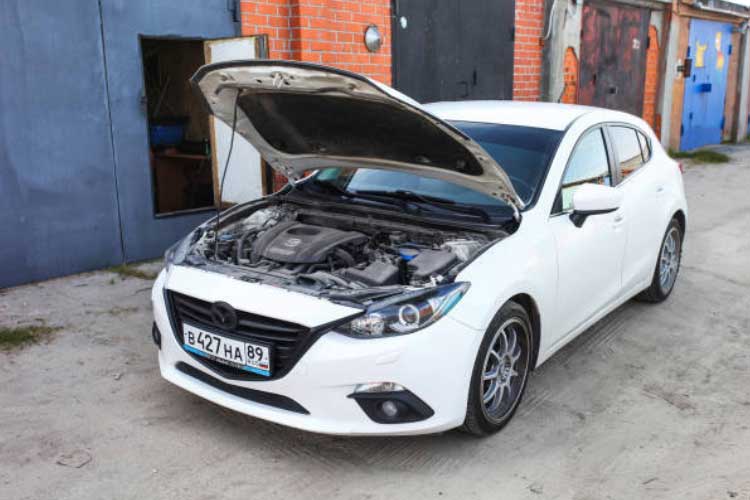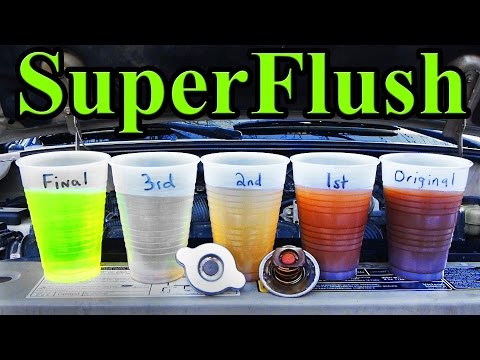We’ve all been there – sitting in our car and suddenly being hit with a strong, fishy odor. It’s not only unpleasant, but it can also be embarrassing if you have passengers with you.
But why does my car smell like fish? Well, the fishy odor in cars can be caused by spilled seafood or bait, leaks in the cooling system, mold, or mildew growth. They can also be caused by damp or musty upholstery, bacteria, and microorganisms, dead fish or other animals, and old or spoiled food. Smoking or vaping inside the car and having pets can also bring this odor.
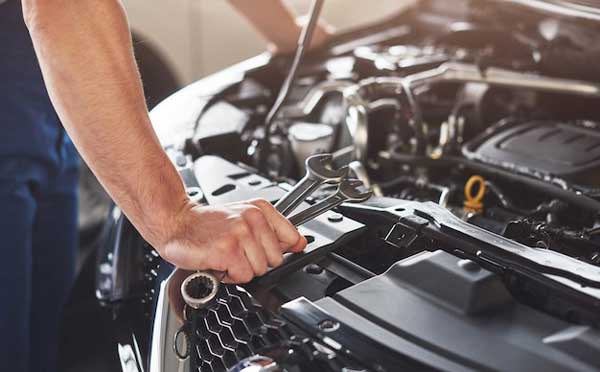
This article will deeply dive into the various causes of fishy odor in cars. We will provide a comprehensive guide on identifying and eliminating the smell.
Why Does My Car Smell Like Fish? Here are the Causes
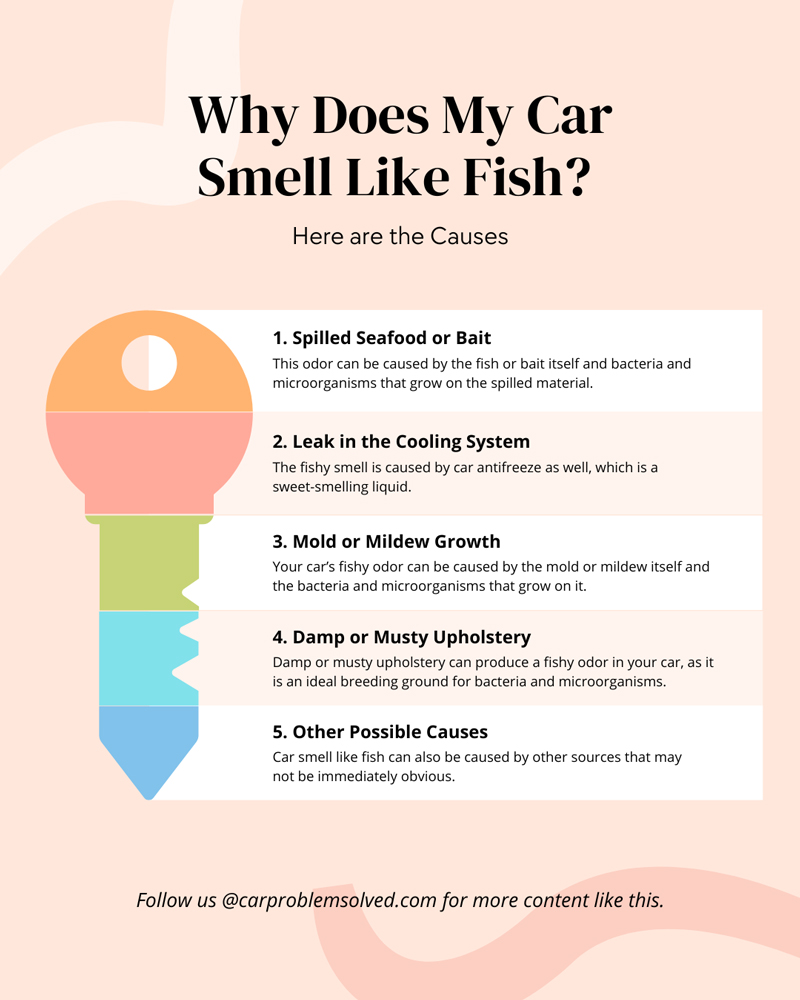
Here is what is bringing fishy odor to your automobile:
1. Spilled Seafood or Bait
This odor can be caused by the fish or bait itself and bacteria and microorganisms that grow on the spilled material. The smell can linger long, even after the debris is removed. That is because the bacteria and microorganisms can continue to grow and produce the odor.

2. Leak in the Cooling System
The fishy smell is caused by car antifreeze as well, which is a sweet-smelling liquid. When the antifreeze leaks and mixes with other fluids, it can produce a fishy smell. The smell can be powerful if the leak is in the heater core or the air conditioning system, as these areas are close to the air vents.
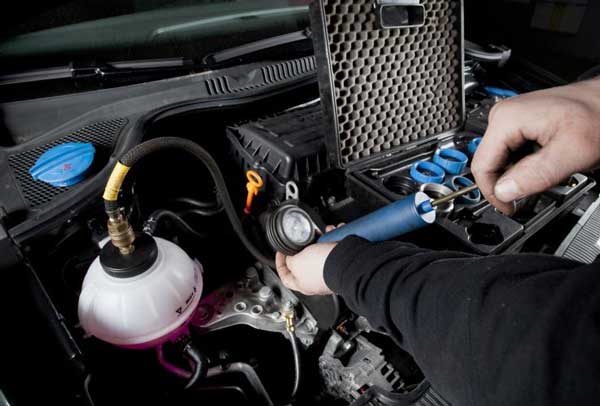
3. Mold or Mildew Growth
Your car’s fishy odor can be caused by the mold or mildew itself and the bacteria and microorganisms that grow on it. As they grow and multiply, these microorganisms can produce a strong, fishy smell.
The smell can be powerful if the mold or mildew is located in the air conditioning or ventilation system, as these areas are close to the air vents.
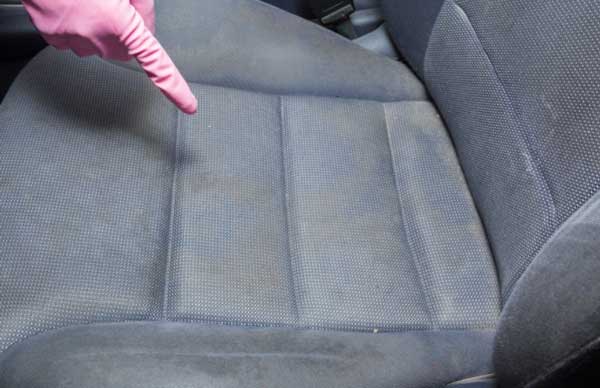
4. Damp or Musty Upholstery
Damp or musty upholstery can produce a fishy odor in your car, as it is an ideal breeding ground for bacteria and microorganisms. Various reasons, such as leaks, condensation, or high humidity levels, can cause dampness or mustiness.
These microorganisms thrive in damp or musty environments and produce a strong, fishy smell as they grow and multiply.
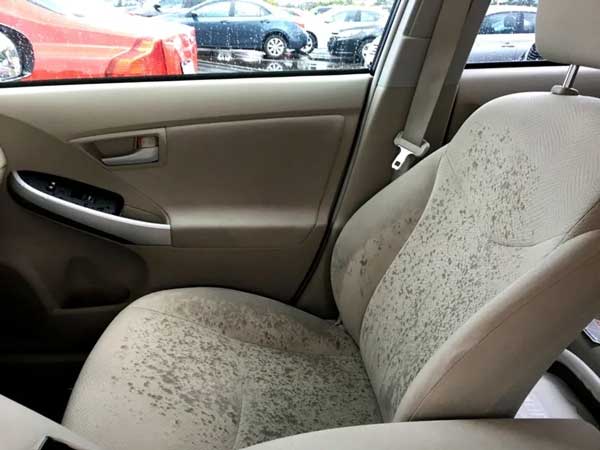
5. Other Possible Causes
Car smell like fish can also be caused by other sources that may not be immediately obvious. These include:
- Decomposing organisms: If a deceased animal, such as a fish, bird, or small mammal, gets trapped in your car, it can emit a strong and persistent fishy odor. The smell will be more pungent if the animal dies in a hidden area where the scent can linger for a long time.
- Food items: If left unrefrigerated or spoiled, food items can emit a strong and unpleasant odor. The smell will be more pungent if the leftovers contain meat or any fish product.
- You own a Jeep Renegade: Jeep Renegades have been reported to have a fishy smell when brand new.
- Smoking or vaping inside the car: Smoking or vaping inside your vehicle can produce a strong, fishy odor. The smell will linger for a long time, even after the smoking or vaping is done.
- Pets or other animals: Pets or other animals that spend a lot of time inside your car can produce an odor similar to fishy. This can be caused by oils and oils excreted by the animal and the accumulation of hair, dander, and other debris.
- Wash water: The wash water used to clean your car might be contaminated. It could be clean but the hose pipe delivering it is dirty.
Identifying the Source of the Odor
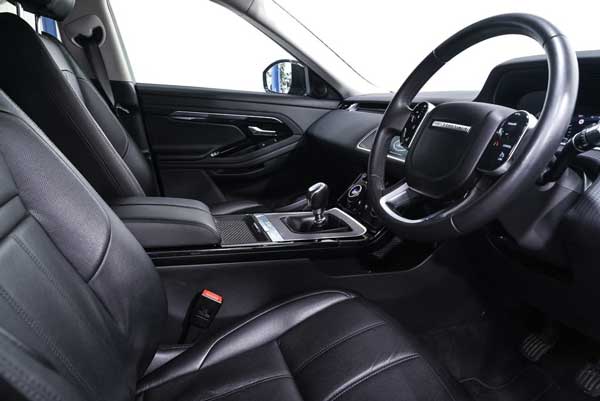
Here is how to know what is causing the odor and where it is located:
1. Inspection of the Interior
Start by looking for any visible signs of spilled seafood or bait, mold or mildew growth, or damp or musty upholstery. Check all compartments, including the glove box, console, and door pockets. Look under the seats, carpets, and floor mats. Use a flashlight to look in tight spaces and crevices.
Look for any visible signs of spilled seafood or bait. This can be anything from small pieces of seafood or bait to stains or residue. As for mold and mildew, look for anything from black or green discoloration to a musty or damp smell.
2. Inspection of the Cooling System
Look for any signs of coolant, such as a green or orange residue, under the hood. Check the hoses and the radiator for any signs of leaks or cracks.
3. Inspection of the Air Conditioning and Ventilation System
Start by inspecting the air ducts, vents, and filters using a flashlight or a black light. Look for any signs of coolant leaks, such as a green or orange residue.
Remove the glove box and the dashboard covers to access the air ducts. This can be done by removing the screws or clips that hold these parts in place. Once you have access to the air ducts, use a flashlight or a black light to inspect them for any signs of coolant leaks or other issues.
4. Follow your nose
Your nose is an excellent tool for tracking down odors. Take a sniff around your car and pay attention to any areas that seem particularly pungent. This can give you a clue where the fishy smell is coming from.
How to Eliminate the Fishy Odor?

Here is a DIY guide on how you can get rid of those odors completely.
1. Removing Spilled Seafood or Bait
Follow the steps below
Step 1. Remove the spilled seafood or bait.
Step 2. Use gloves and a damp cloth or sponge to wipe up any visible pieces of seafood or bait.
Step 3. Pay attention to tight spaces and crevices, as these areas can be easily missed.
Step 4. Use a vacuum cleaner to remove any remaining debris once you have removed as much seafood or bait as possible.
2. Cleaning the Interior
Use these steps:
Step 1. Start by removing any trash or debris from the car. This includes empty cups, fast food wrappers, and other items contributing to the fishy odor.
Step 2. Next, use a vacuum cleaner to remove any dirt or debris from the carpets, upholstery, and floor mats. Pay attention to tight spaces and crevices, as these areas can easily trap dirt and debris.
Step 3. Mix a mild detergent with warm water to clean the carpets, upholstery, and floor mats. A mild dish soap or laundry detergent can be used. Use a brush or a scrub brush to agitate the detergent and loosen any dirt or debris.
Step 4. Use a damp cloth or sponge to remove any remaining detergent or debris. Be sure to wring out the material or sponge well to avoid leaving any excess water in the car.
Step 5. Dry the carpets, upholstery, and floor mats thoroughly. Use a towel or a chamois to absorb any remaining moisture. You can also dry them using sunlight.
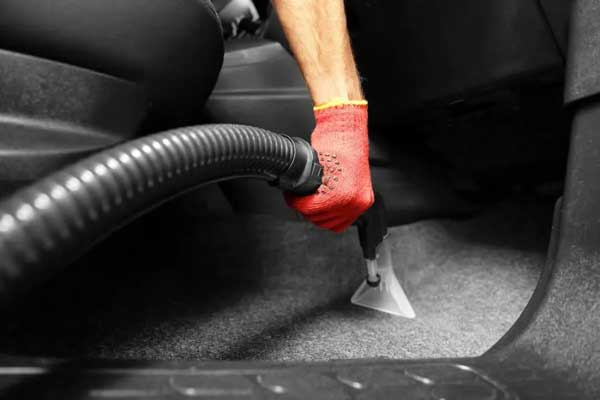
3. Repairing and Cleaning the Cooling System
Use the steps below:
Step 1. Start by identifying the source of the leak. Common signs of a coolant leak include a green or orange residue, a puddle under the car, or a low coolant level. If you suspect a leak, use a flashlight or a black light to inspect the hoses, clamps, and connections for any signs of damage or wear.
Step 2. Once the source of the leak has been identified, use a sealant or a patch kit to repair it. Follow the manufacturer’s instructions to repair the leak.
Step 3. Use a coolant flush solution to flush the system. This will remove any debris and buildup that might have accumulated in the ducts, which can cause leaks and odors.
Step 4. Once you have finished flushing the system, use a vacuum cleaner to remove any remaining debris.
Step 5. Refill the coolant liquid to the proper level and dispose of the old coolant properly.
Watch this video to learn how to flush the cooling system
4. Using Air Fresheners and Odor Eliminators
Once you have removed the source of the fishy odor and cleaned the interior and cooling system, it’s essential to use air fresheners and odor eliminators to eliminate any remaining odor. There are several options available, including:
- Car Air Fresheners: These are specifically designed for use in cars and can be hung from the rearview mirror or placed in the air vents. They come in various scents, including citrus, vanilla, and pine, and can help neutralize smell like fish.
- Odor Eliminator Spray: These sprays neutralize and eliminate odors. They can be sprayed directly on carpets, upholstery, floor mats, and in the air.
- Baking soda and Vinegar: Mix a cup of baking soda with a cup of white vinegar and place the mixture in a shallow dish in the car. Leave the mixture in the car for a few hours to absorb the odor.
- Charcoal: Simply place a small bag of activated charcoal in the car, and it will absorb the odor.
You can also use other options, such as ozone generators, lemons, and dehumidifiers.
If you’re dealing with a fishy smell in your car, you may also be interested in our articles on why your car smells like burning oil when the heater is on or why your car smells like burning oil after driving. Our article on why your car smells like burning oil when the heater is on explains the possible causes of this smell, such as a leaking valve cover gasket, a damaged or worn-out oil pan, or a malfunctioning PCV valve. Meanwhile, our article on why your car smells like burning oil after driving discusses the possible causes of this smell, such as overheated brakes, a worn-out clutch, or a damaged transmission. If you’re experiencing any of these smells in your car, our articles can help you diagnose and fix the problem.FAQs
Here are answers to queries that might come up during the process:
It depends on the severity of the fishy odor and your experience and comfort with DIY projects. If the smell is mild and you are comfortable with cleaning and basic maintenance, you can eliminate the fishy smell.
The key is to keep your car clean and dry. Use a dehumidifier to keep your car cool and dry to avoid their growth.
Conclusion
If you were wondering, why does my car smell like fish? The above information should have given you an idea about removing the odor. To prevent future fishy odor, keep your car clean and dry, use a dehumidifier, use a car cover, and park in a dry place.
You should also fix leaks immediately and avoid smoking or vaping inside the car. With the right approach, you can eliminate this smell like fish from your vehicle and keep it fresh and smelling clean.
